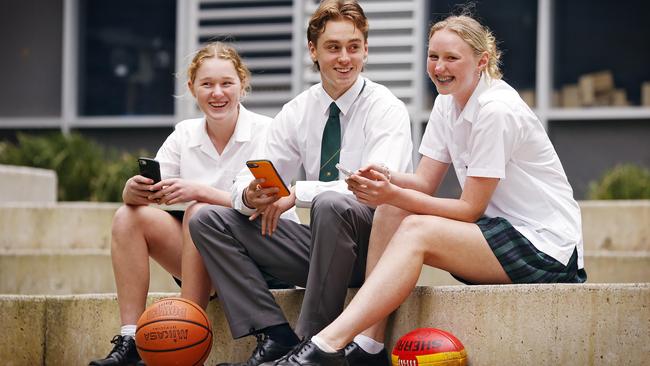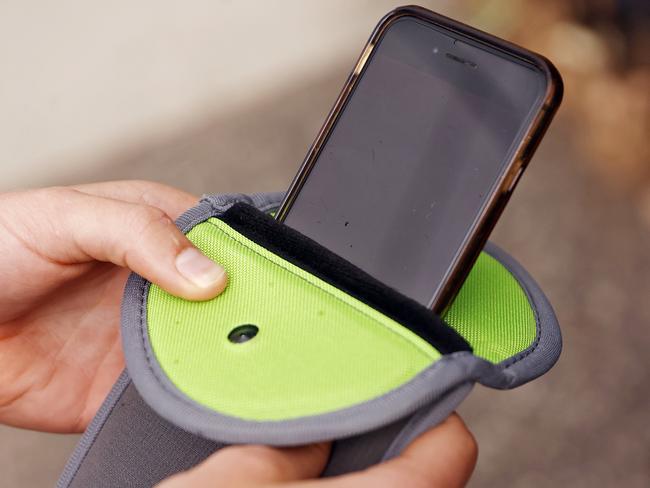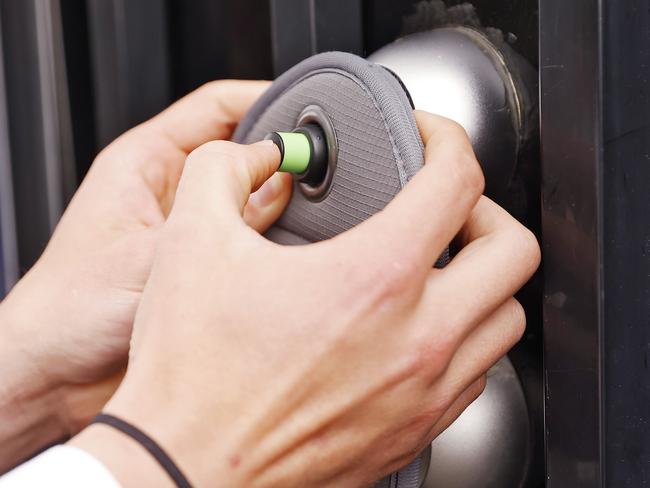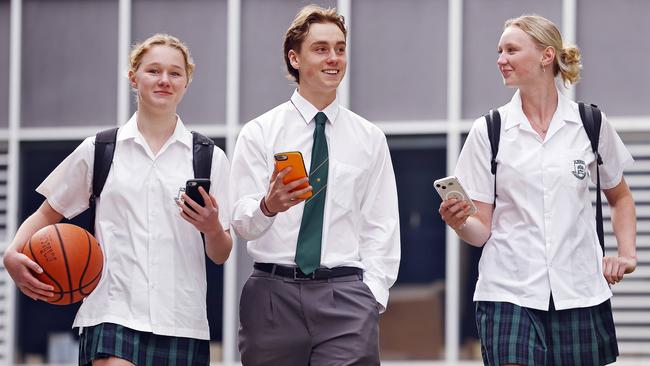Why phone ban rings true for one high school
On Monday, mobile phones will be banned in all NSW public high schools. Read about the surprising results when the change took place at the start of this year at one Sydney school.
NSW
Don't miss out on the headlines from NSW. Followed categories will be added to My News.
It’s a sight most school principals dream of, but few get to witness: high school kids sitting around playing board games during lunchtime. Teenagers, engrossed in books or knitting. Rosy cheeks, grass-stained school uniforms, and sweaty kids.
For principal Robin Chand, it signifies one thing — these kids are not glued to their phones.
On Monday, mobile phones will be banned in all NSW public high schools, a move championed by the Labor government after years of concerns about phones impacting students’ learning and wellbeing.
Under the new rules, students are still permitted to carry a phone, however, it cannot be used during school hours.
While other schools nervously brace for the rollout, some schools have gotten ahead of the game.
At Killara High School, on Sydney’s north shore, mobile phones have been banned since the start of the year.

Each morning, students place their mobile phone in a special ‘yondr’ pouch. Once inside, the only way to open the pouch is with an unlocking station located outside the school gates.
While Mr Chand said students were initially apprehensive about the move, he was shocked by the response.
“I was overwhelmingly, positively surprised at how quick students were able to adjust and accept [the ban], and now I‘m proud to say that it’s part of our school culture.”

His only regret? That he didn’t do it earlier.
“I had a year 12 student say to me, ‘Mr. Chand, I was very opposed to this policy when it was introduced. However, I think it has been one of the one of the single most beneficial things to have occurred to support my learning’.
“(Before the ban) phones were a significant point of distraction inside and outside of the classroom. And we were noticing the addictive impact of the phones and the cognitive overload that students were experiencing as a result of mobile phones,” he said.
He said students feel empowered since the ban.
“Some students who were essentially always looking at their mobile phone screens feel possibly liberated. And there is power in the collective experience because it doesn‘t put pressure on one child or one group,” Mr Chand said.
Since implementing the ban there’s been a dramatic change in the schoolyard. Library book borrowing has skyrocketed. The school has had to order new board games as students flock to lunchtime monopoly. And bullying is at its lowest.

Many parents strongly support the move, with one claiming: “There were lots of requests from parents for the kids not to use mobile phones at school. So we’re absolutely thrilled, I think from a parent perspective.
“The yondr pouches are seen as a sort of a transitional tool to go from a space where kids have ready access to phones to just changing the culture of the school to a no phone policy. You need something in place and the yondr pouches have been great for that.”
Year 12 student Robbie Tooth was originally nervous about the move, but has come around.
“I think the phone pouches have been great. It’s really given me an opportunity to remove any distractions in the classroom and playground,” he said.
“I feel like it’s improved my ability to socialise with my friends and other people in the playground while also just my focus in class has just grown exponentially.”
Principal Chand added: “Online bullying has reduced almost down to the very odd one or two incidences a year … Before that I would say we would have maybe four or five incidents a term“.
As schools across the state brace for the ban, Mr Chand recommends schools work with the students, not against them.
“Work with the community and use the expertise of staff at school, and take your time to inform the community and students about the reasons behind the decision and the policy.

“Then there‘s no ambiguity. Everyone’s clear in terms of why we’re all doing this. And one of the strongest elements for us has been that all 1600-plus students are involved in this.”
Under the ban, individual schools have the freedom to choose how they wish to implement the policy. While some schools, like Killara High use the Yondr pouches, others are using other methods.
According to the Department of Education, schools are implementing various methods to monitor phone use, including keeping phones in school bags and lockers, having students drop off their phones at the front office at the beginning of the day, and collecting phones at the start of each lesson.
At the discretion of a teacher or principal, exceptions can be made to the policy on a case-by-case basis for learning, health or wellbeing, such as smart watch blood sugar monitoring.
However, despite Mr Chand’s positive experience, some teachers are apprehensive.
NSW Teacher’s Federation Acting president Amber Flohm said that, while the union sees it as a “positive move”, they do expect it to add to teacher’s workload.
“We see it as a positive thing. However, a new government policy such as this does have an impact on teacher and principal workload, there is no doubt about that.
“There will be teething periods while students adjust to the new settings. It‘s important to remember that this is a government policy, and it’s not an individual school who’s made a decision, and teachers and schools will need parental support for this mobile phone ban to be successful,” she said.
Have an education story? Contact emily.kowal@news.com.au
HOW SCHOOLS BAN PHONES
b ‘Off and away’: Phones typically kept in school bag but not used.
b Phone must be kept in a locker for whole school day.
b Phone put in magnetically locked pouch, which is only unlocked at a special station.
b Students hand in phones at school’s front office at start of day.
b Teacher collects and stores phones at start of a lesson.
b Students are still permitted to carry a phone while travelling to and from school.
HOW TEENS ARE GETTING AROUND THE PHONE BAN
b Teens have taken to social media to share ways of defeating the popular phone locking device ‘Yondr’ – a small pouch that uses a magnetic system to lock phones that can only be unlocked at a locking station.
b Some recommend using old phones or calculators to put in the pouches, so they can keep their mobile phones with them.
b TikTok videos show how to use simple brute force to ‘smash out’ the in-built magnets which keep the pouches shut – by throwing them on the ground or against stairs.
b Others advise to take their own magnets to school to use as an unlocking device.





